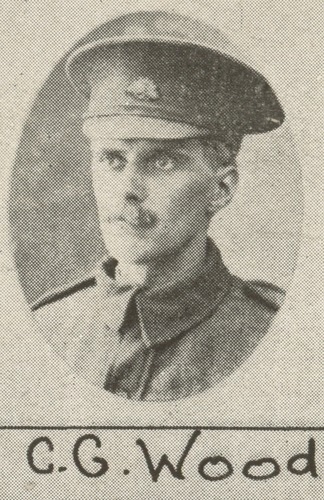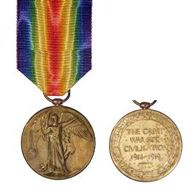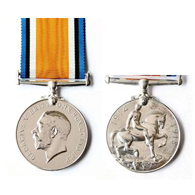WOOD Charles George
-

- 6890
- Private
- 25 Battalion
- 26th Battalion
- Beerburrum Soldier Settlement
- Yes
- January 1883
- Sevenoaks, Kent, England
- 26 January 1917
- HMAT A20 Hororata
- 13 June 1917
- Sydney
-
Family
In the Census for England and Wales of 1891, Charlie Wood (8) lived with his parents John and Louisa and four older siblings (John, Blanche, Harry and Maud) at Oak Lane, Sevenoaks in Kent. John was a carpenter. In the Census ten years later, the family were recorded at 13 High St., Sevenoaks. Charlie's father was a sub-postmaster and Charlie was a civil letter carrier.
Charlie George Wood married Rosa Eliza Wheatley in St. Matthew's Church, Redhill, Surrey, on 20 October 1907.
Charlie's father, John Jerome Wood, died in 1909 in Sevenoaks.
In the Census for England and Wales in April 1911, Charlie (28) and his wife Rosa Eliza (37) and their daughter Mary Rose (1) were recorded at Fairview, Kemsing, Sevenoaks, Kent. Charlie was a "house carpenter". The notional head of household was Charlie's older brother, Harry Hickory Wood (36), who was a US citizen but a British subject by birth. The matriarch of the family, widow Louisa Wood, aged 69, also in the home, was likely the power behind the throne.
Later that year, Rosa Wood gave birth to a second daughter, Elsie.
Charlie and Rosa Wood and their daughters emigrated to Australia in 1913. Charlie's mother, Louisa, also came to Australia.
Military Context
The 25th Battalion, as part of the 2nd Australian Division, took part in its first major battle in France at Pozieres between 25 July and 7 August 1916. In October, the 2nd Division moved south to again attack in the Somme Valley. The 25th Battalion took part in two attacks to the east of Flers, both of which floundered in mud. Although it acted in a supporting role at the second battle of Bullecourt, the 25th did not carry out a major offensive role again until 20 September 1917 when it was part of the first wave at the battle of Menin Road in Belgium. Victory there was followed up by the capture of Broodseinde Ridge on 4 October 1917.
By mid 1918, the strength of the AIF had been sapped by casualties and lack of reinforcements, most recently through repulse of the German spring offensive. In September 1918, the 25th was one of several battalions ordered to disband to reinforce others. The men resisted the orders for some time. On 4 October, the 25th Battalion commenced its last major action in breaching German defences around Beaurevoir.
Enlistment
Charlie George Wood enlisted at Brisbane on 26 January 1917, long before it would generally be called "Australia Day". His name was carried in the "Brisbane Courier" on 27 January under the heading "Volunteers in Brisbane". He had previously been rejected for military service because of poor teeth. He was a natural born British subject and had been born in the parish of Sevenoaks, Kent, England. He declared his age as 34 years and occupation as "carpenter". He was 5 feet 8 1/2 inches in height, weighed 132 pounds, of dark complexion, with hazel eyes and dark grey hair. His religion was Church of England and he listed his wife, Rosa Eliza Wood, 41 George St., Kangaroo Point, as his next of kin. He was the father of two children and he agreed to allot not less than three-fifths of his army pay to the support of his family. His final Will was lodged with his wife.
His service number was 6890. On 3 May 1917, at the Rifle Range, Enoggera, he was allocated to the 20th Reinforcements of the 25th Battalion.
Military service
On enlistment, he trained with the 11th Depot Battalion until 30 April.
With other 20th Reinforcements, he embarked from Sydney on HMAT A20 "Hororata" on 13 June 1917. He suffered from influenza during the voyage, reporting to hospital on the ship on 26 June and only being discharged on 21 July. The ship arrived at Liverpool, England, on 25 August.
On 27 August 1917, he marched into the 7th Training Battalion at Rollestone. On 17 November, he transferred to the 5th Training Battalion at Fovant. Both camps were in Wiltshire.
On 27 December 1917, he proceeded from the 5th Training Battalion at Fovant to Southampton and thence to France. He was taken on strength of the 25th Battalion in the field on 4 January 1918.
Private Wood transferred to the 26th Battalion on 12 October 1918, a month before Armistice was declared. The day after Armistice, he was granted leave to England, returning to his unit on 30 November. On 10 December 1918, Private Wood was detached to the Corps Reinforcement Wing. He re-joined the 26th Battalion on Christmas Day.
On 22 April 1919, he was detached to the Divisional YMCA. He returned to 26th Battalion on 15 May. On 26 May, he left France and marched in at Sutton Veny, England, in preparation for return to Australia.
Repatriation
Private Wood returned to Australia on the HMAT A34 "Persic". He embarked on 13 July, departed London on 17 July, and disembarked at Melbourne on 28 August (his family were advised of his impending return on 1 August). At his final medical on 3 September, he was declared free of any disability. He was discharged from the A.I.F. at Brisbane on 3 October 1919.
After the War
Charlie Wood was issued the British War medal and the Victory medal.
In the Electoral Roll of 1919, Charlie and Rosa were recorded at 41 George St., Kangaroo Point. Charlie was a carpenter, and Charlie's mother Louisa was living with them. By then, she was 77 years of age.
In the Electoral Roll of 1925, Charles George Wood, carpenter, and Rose Eliza Wood, home duties, were recorded at Ludlow St., Gaythorne.
In the Roll of 1937, Rosa was living at Hope St., South Brisbane with her daughters Mary Rose, bookkeeper, and Elsie, a clerk. In 1943 and 1949, they were recorded at 19 Musgrave St., Toowong and both daughters were clerks.
From 1954 to 1968, Rose Eliza, home duties, and Mary Rose, bookkeeper, were at Meecham St., Grange.
Charlie's widow, Rose Eliza Wood, aged 99 years, died on 26th May 1972 in the Amarina Convalescent Home, Albion.The cause of death was "cerebral thrombosis". The informant to her death certificate was her daughter Elsie Ridgley of 3 Meecham St., Grange. The funeral service, according to the rites of the Church of England, was conducted on 29 May at Mount Thompson Crematorium.
Her daughter, Mary Rose, who never married, continued to live at Meecham St., Grange. By 1977, Elsie and her husband Ronald Forsythe Ridgley, a public servant, had move to 14 Ellerslie Crescent, St. Lucia.
-
- Amiens
- Hamel
- Morlancourt
-

-

- Returned to Australia
- 28 August 1919
-
Australian War Memorial
National Australia Archives
Ancestry.com
Trove digitalised newspapers
Queensland Death certificate (Rose Eliza Wood) registration number 1972/32338
- Charlie50
